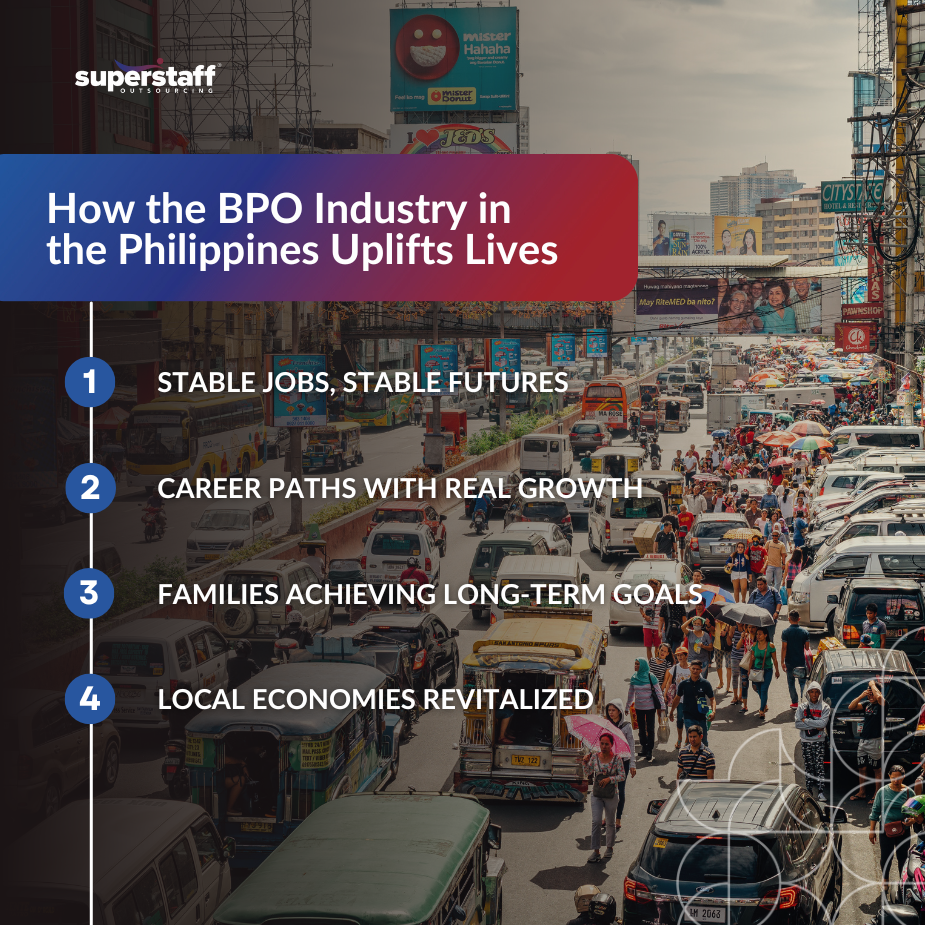
BPO jobs do more than answer calls—they’re fueling a national economic shift. Over the past two decades, the BPO industry in the Philippines has transformed from a niche sector into one of the country’s most powerful economic drivers.
It has redefined what sustainable employment looks like for an emerging economy. And as companies around the world increasingly turn to outsourcing, they’re doing more than enhancing their customer support—they’re reshaping lives.
Gone are the days when business process outsourcing was considered a temporary job for fresh graduates. Today, BPO roles offer structured career paths, competitive salaries, and the opportunity to build a future.
The BPO industry in the Philippines has become a core engine behind the country’s growing middle class, providing the kind of stability and upward mobility that once felt out of reach for many Filipinos. This blog explores how outsourcing is helping transform individual lives, strengthen communities, and create lasting economic impact.
Building Careers, Not Just Jobs

One of the clearest signs that the BPO industry in the Philippines is lifting people into the middle class is the career trajectory it provides. What sets BPO roles apart from other employment opportunities in developing economies is the combination of decent starting pay and clear promotional pathways. While many entry-level roles in other sectors offer minimum wage or less, BPOs tend to start well above the national average. This income stability is a game-changer for families trying to escape paycheck-to-paycheck living.
Add to that the benefits many BPO workers receive: private healthcare, government-mandated social protection, and often additional wellness perks like mental health consultations or gym memberships. These benefits of BPO jobs in the Philippines make them not only attractive but life-changing.
For many, this is the first time they’ve been able to access healthcare independently or envision a retirement plan. Promotion from agent to team lead to supervisor and even manager is often based on performance, not just credentials, opening doors for people from all walks of life.
The BPO industry in the Philippines doesn’t just offer jobs—it creates legitimate career ladders. With structured development plans, mentorship, and ongoing training, BPO workers can envision a professional future that includes leadership roles, specialized skills development, and even international career tracks.
Redefining Middle-Class Life
The financial gains from BPO employment are not just theoretical—they’re visible in the lives of Filipino workers. Employees are now buying their first homes, driving their first cars, and investing in their children’s education at private institutions. These changes signal a fundamental shift in what’s possible for the average Filipino family.
This is middle class growth in the Philippines in real time. Employees are improving their credit scores, taking out responsible loans, and reinvesting into the local economy. The rise of BPO hubs outside major cities is further accelerating this momentum, as smaller provinces enjoy a wave of development tied directly to outsourcing revenues.
As the BPO industry in the Philippines expands, so does the purchasing power of the average worker. Retail, housing, and services all benefit from the injection of disposable income, helping the country transition from consumption driven by remittances to one driven by earned income.
Empowerment Through Work-Life Balance
A major—but often underreported—benefit of the BPO model is its impact on quality of life. Many jobs in the BPO industry in the Philippines offer flexible scheduling, which allows workers to plan their lives in a way that prioritizes family and personal growth. For night-shift workers, daytime hours mean more time with their children or attending school functions. For others, rotating shifts provide space for graduate studies or caregiving.
It’s not just the hours. The culture within most Philippine BPOs emphasizes inclusivity, teamwork, and continuous learning. Many companies provide access to skills development, language training, and even leadership academies. Beyond technical skills, employees gain confidence, communication mastery, and a sense of community. Team-building events, wellness days, and CSR activities help workers stay connected and valued—something not always found in other industries.
This isn’t just good for morale. It’s one of the most tangible benefits of BPO jobs in the Philippines. Workers feel appreciated and supported, and in return, companies benefit from lower attrition and higher engagement. In many ways, this cultural richness sets Philippine BPOs apart from global competitors and continues to attract top-tier talent.
These dynamics aren’t simply perks—they represent how outsourcing jobs improve quality of life in the Philippines, changing how workers experience their day-to-day lives and envision their future.
Revitalizing Communities Across the Country
The success of the BPO industry in the Philippines is no longer confined to Metro Manila. Provincial cities like Iloilo, Bacolod, Davao, and Cagayan de Oro have emerged as competitive outsourcing destinations, bringing opportunity to regions that have historically lagged in economic development. This decentralization is critical, as it spreads economic gains and relieves pressure on urban infrastructure.
What happens when a BPO opens in a provincial city? Local economies get an immediate boost. Restaurants, laundromats, transportation services, and real estate developers all benefit from the influx of workers with steady incomes. New buildings rise. More families send kids to college. Local governments receive increased tax revenue, which can be used to improve roads, schools, and clinics.
This growth isn’t accidental—it’s strategic. BPO companies are intentionally building in the provinces, where talent is abundant and competition is manageable. The BPO industry in the Philippines is thus a key enabler of balanced economic development. It helps keep families together, reduces migration to Manila or abroad, and creates pockets of middle-class prosperity across the country.
Creating Space for Everyone
Another strength of the BPO industry in the Philippines is its inclusiveness. Outsourcing firms lead the way when it comes to offering opportunities for people often excluded from traditional employment tracks. Working students, single mothers, LGBTQ+ workers, and persons with disabilities are finding stable careers within this sector.
These aren’t token hires—they’re part of a larger movement toward diversity and equality in the workplace. Skills-based hiring practices allow individuals to succeed regardless of their formal educational background. Many entry-level roles are accessible with just the right attitude and communication skills, and the training infrastructure ensures that everyone has a chance to grow.
This commitment to inclusivity results in something more powerful than a paycheck. It builds self-esteem, community connection, and pride. These are the intangibles that support a more cohesive society. And from a business perspective, this inclusivity leads to greater innovation, stronger teams, and a more resilient workforce.
By welcoming all backgrounds, the BPO industry in the Philippines is helping to redefine what it means to belong in the modern workforce—and proving that opportunity can be a tool for equality.
Transforming Global Partnerships Into Local Progress
For companies outsourcing their operations, the benefits are clear: cost savings, scalable teams, and 24/7 coverage. But when global businesses choose the Philippines as their partner, they’re doing more than making an operational decision—they’re investing in transformation.
Each job created in the BPO industry in the Philippines has a ripple effect. These jobs fund groceries, school supplies, home repairs, and medical expenses. They help families weather inflation, save for the future, and give back to their communities. In short, they create stability.
From a macroeconomic perspective, outsourcing boosts GDP, drives digital fluency, and improves the country’s ability to respond to global challenges. It anchors international partnerships in something more than profit—it anchors them in progress. Clients become contributors to a workforce that values dedication, empathy, and innovation.
And with outsourcing firms like SuperStaff leading the charge, businesses abroad can partner confidently, knowing their decision will benefit not only their bottom line but also real people, real families, and real communities.
The BPO Industry in the Philippines Is Shaping a New Middle Class
The BPO industry in the Philippines is creating more than call center agents—it’s creating a resilient, empowered, and growing middle class. This sector is no longer just a solution for cost reduction; it’s a catalyst for sustainable development and inclusive economic growth.
From the financial freedom of first-time homebuyers to the empowerment of marginalized communities and the rise of vibrant provincial economies, the impact goes far beyond cost savings. And through it all, the core promise of the BPO sector remains: opportunity. Opportunity to grow, to lead, to support a family, and to contribute meaningfully to society.
At SuperStaff, we believe in people-powered outsourcing. When you partner with us, you’re choosing a team that delivers exceptional results while helping drive national progress. Let’s build something transformative—together.






